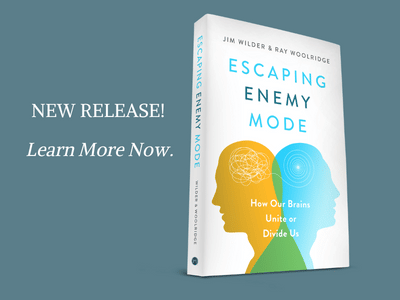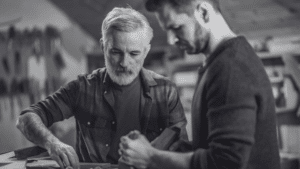By Hannah Ploegstra
Gen Z is a delightful generation whose collective history has set them up to be hungry for input from elders. They were babies and toddlers when 9/11 happened, formed their group identities with the help of social media and iPhones, and when it was finally time to head out into the world and make a life for themselves, COVID-19 shut down the world – which to their young minds, felt like an end of the story. Their story. And we wonder why they’re confused.
As parents and elders, they need us to tell (and invite them into) the bigger story. They want to know all about record players, Fleetwood Mac, and how people dated before iPhones. The movies they are watching – and making – are often centered around history and retold stories (“remakes”). There is also the bigger story of God’s family, of his firstborn Son, and of the life he is preparing for us.
There’s only one way to invite someone into your story, and that is to share your life with them, because life is story. Here are some ways elders can continue writing the story with Gen Z – and ensure that it does end well for them. What does a happy ending look like for Gen Z? Simple. They mature to become good parents to our grandchildren (Generation Beta) and elders to our great-grandchildren (Generation Gamma).
Hospitality – Most of the people I know who are between 12-27 (the current ages of Gen Z) feel a lack of home and family. They long to be inside spaces that are set up for normal everyday human life. As a generation, they typically love to try interesting foods, hear true stories, and look at old pictures. What could be easier fun than to invite a little friend group over and spend the evening doing human things? Plan an evening with a Gen Zer you know and encourage them to bring 2-3 friends. They’ll come! And they’ll be thrilled.
Trust — Gen Zers are fully aware of the cynical comments older people make about their generation: “They don’t know how to work.” “They’re constantly on their phones.” “They all still live at home with their parents.” We roll our eyes. Kids these days. But they aren’t kids anymore. They are adults, learning to “take care of themselves and one other person with fairness.” Part of why we don’t see them doing this is that our technologies, systems, and infrastructures – all of which developed while Gen Z was in diapers and none of which they invented or asked for – are designed to do everything humans were designed to do (including to think). Elders can override this neglect of human value by inviting Gen Zers into good work that can be done together. Hands-on, practical, useful work learned in the presence of an encouraging elder feels to them like a sacred trust in their human worth. Trust them to want to work.
Hope We used to call older people in our lives “role models.” Gen Z is fiercely oriented around personal identity and they don’t really see people in terms of roles or models. However, we all still need people we want to be like and become like. The Christian life of discipleship is marked by this desire – to become like Jesus. And what draws Gen Zers into relationships with people they want to be like is the presence of hope in those older people. Elders who are still joyful, still learning, still growing, still useful to others, give Gen Z hope for their own futures. Be prepared to give them “a reason for the hope that is in you” (1 Peter 3:15). “These are the best years of my life,” I once said earnestly to a room full of Gen Zers, and amid shrieks of delighted disbelief, a few of them nearly cried with relief. And I’m only 49.
Attachment The story of Gen Z has produced an unfortunate common side effect: poor attachment. Attachment is that message the brain sends to you that something is personal to you. If you have a heart for Gen Z, I would suggest you ask God to open your eyes to just a few 12-27 year olds around you who he wants to make personal to you. Maturity cannot be mass produced. Pursue this in prayer before you make any wild moves. Ask Jesus to give you the grace to invite that one young person into your space (hospitality) rather than invading their lives with your opinions and advice. Teach them your skills – whatever they might be – and tell them they have what it takes (trust). Find your own source of joy in Jesus and let it spill out in your language about their futures (hope). If each elder were to make one or two Gen Zers “personal to me,” we could be used by God to write a happy ending for this precious generation. Isn’t that what elders do anyway?









